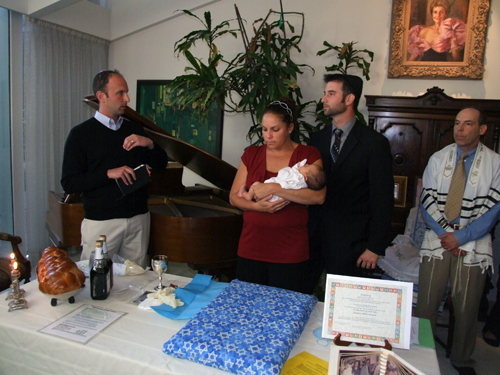
By Donald H. Harrison

SAN DIEGO – When he performs the brit milah ceremony, Dr. Stuart Rubenstein, a pediatrician and mohel, often reflects upon the spiritual importance of Shabbat. His comments on Tuesday, May 7, about the spirituality of Shabbat brought back memories for Rabbi Matthew Earne of another spiritual Shabbat in a far-off place.
Rubenstein is quite knowledgeable about Jewish tradition, especially about those customs surrounding the brit milah when an 8-day-old Jewish boy is circumcised.
At such a ceremony for Jaxson Asher Greene, son of Daniel and Samantha Greene and younger brother of Lexi Greene, Dr. Rubenstein said there is a spiritual reason why the surgical procedure is performed on the eighth day and not before.
He said that Judaism wants the young boy not only to be physically ready for the removal of the foreskin from his penis, but also to be spiritually ready. No matter what day of the week the boy was born, by the eighth day of his life he will have experienced at least one Shabbat.
In Jewish mystical tradition, the Sabbath—or seventh day of the week—is likened to a Queen. Before meeting the King (eg, God), it’s considered mandatory that one first meet the Queen, Rubenstein said.
Two Conservative rabbis attended the brit milah for Jaxson at the Alvarado Estates home of his paternal grandparents, Norman and Roberta Greene. One was Rabbi Earne, associate rabbi of Congregation Beth Am, who participated in the boy’s formal Hebrew naming ceremony after the circumcision. The other was Rabbi Scott Meltzer, the spiritual leader of Ohr Shalom Synagogue and a boyhood friend of Jaxson’s father, Dan, an attorney.
During the reception following the ceremonies, Rabbi Earne related a story about one very special Shabbat that he had celebrated while still a rabbinical student at the Jewish Theological Seminary in New York City.
His sister, Julie, an employee of a non-governmental organization seeking to stimulate small entrepreneurial enterprises in the developing world, was stationed at the time in Uganda, and Earne had arranged to visit her during his vacation period.
A couple weeks before leaving the United States for the East African nation, he happened to attend, by coincidence, a talk at a synagogue at which the speaker was Rabbi Gershom Sizomu, spiritual leader of the Abayudaya people of Uganda.
Rabbi Sizomu told of his people’s longstanding practice of Judaism and the controversy in Israel over whether they are really Jews – a controversy that Sizomu subsequently sought to put at rest by sponsoring a mass conversion ceremony for the Abayudaya people as well as for other black Africans who trace their lineage to Jews who migrated south from ancient Israel.
Rabbi Sizomu invited his listeners to come visit him and his people sometime in Uganda, and Earne’s arm shot up to get his attention. “I’ll be there in two weeks!” the excited rabbinical student said.
Some in the audience thought Earne was making a joke, but of course he wasn’t.
The Abayudaya villages are near the small city of Mbale in eastern Uganda. To get to them, one must travel off-road through the bush, Earne said.
On a Friday afternoon, feeling he may have been as far removed from the Jewish world as possible, Earne was driven to meet the Abayudaya people.
On a pathway to one of the villages, two boys were standing, waiting for their visitors. They both were wearing colorful kippahs on their heads.
Earne emerged from the car and the boys looked him over, smiled, and said, “Shabbat Shalom!”
The rural Abayudaya villages had no electricity. Shabbat candles were the only source of light for reading the siddur, around which villages formed a close circle. Similarly the Shabbat meal was by candlelight.
It was quite spiritual, Rabbi Earne said, “to be there, and to realize how connected we are to our fellow Jews.”
The connection to the Abayudaya was more than a fleeting one for Earne.
Eventually Earne started looking for a place where he could do an internship as a rabbi. He chose Uganda, where he became an assistant to Rabbi Sizomu and a lifelong friend.
After he returned to the United States, he heard of an opening for an assistant rabbi at Congregation Beth Am, where Rabbi David Kornberg is the senior rabbi.
Earne related that new rabbis, just starting out on their careers, compete for spots in San Diego, attracted by the California city’s year-round good weather. He said he thought the odds were against him when he applied for the job, given that there were so many other candidates.
However, one of the members of the selection committee, coincidentally, was wearing a distinctive kippah made by the Abayudaya . Earne, of course, recognized its origin. That led to a conversation about his work with the Abayudaya and eventually to an offer for him to come to Congregation Beth Am. Now at Congregation Beth Am for seven years, he has been elevated to associate rabbi.
Upcoming for Rabbi Earne is another trip to visit his sister, who has been continuing her work in micro-finance. She has relocated from Uganda to the Republic of South Africa.
It will be interesting to see what new adventures may await the rabbi.
*
Harrison is editor of San Diego Jewish World. He may be contacted at donald.harrison@sdjewishworld.com